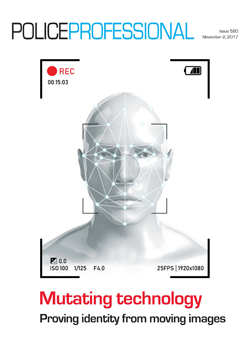View the latest edition online
In this weeks edition we have news of the NPCC and College of Policing releasing a guidance video on restraint, the House of Commons Justice Committee has called for an urgent review of the Disclosure and Barring Service filtering system and officers could soon be allowed to interview suspects at crime scenes using body-worn video. There is lots more news and features including a look at how facial recognition systems could benefit from genome research, scientists have found a way to identify people by the rhythms and dimensions of their heart, technology has been developed that identifies posts on Twitter linked to the online sale of illegal drugs, a US study suggests closure orders could link to a rise in offending and Professor Colin Rogers questions whether the removal of PCSOs will lead to a loss of legitimacy at Norfolk Constabulary. We also look back on the launch of Sir Hugh Orde/Professor Sir Desmond Rea`s account of the investigation into the Omagh bombing.
In this weeks edition we have news of the National Police Chiefs Council and College of Policing releasing a guidance video on restraint following review of deaths in custody, the House of Commons Justice Committee has called for an urgent review of the Disclosure and Barring Service filtering system and officers could soon be allowed to interview suspects at crime scenes using body-worn video. There is lots more news and features including: End of the foot patrol? Professor Colin Rogers asks whether the proposal by Norfolk Constabulary to remove the role of police community support officer, if replicated elsewhere, could lead to a loss of the services legitimacy. Dealing on app Law enforcement is having to get smart to identify trends in drug selling as pushers take to online classified sites and social media apps. Calling time on crime? Forces and local authorities across the country are increasingly turning to closure orders to deal with licensed premises that become crime hotspots, but one US study suggests this may in fact cause a spike in offending. Bear in mind the lessons At the official London launch of Sir Hugh Orde and Professor Sir Desmond Reas account of the investigation into the Omagh bombing, senior figures reflected on the need to strive for justice even in the most difficult situations. Biometrics on the beat The human body has many identifying features and scientists have now found that the heart may contain unique characteristics that could assist law enforcement when it comes to identification. Mutating technology Facial recognition systems could benefit from genome research that shows how to identify people from different angles, allowing law enforcement to spot those elusive individuals using cameras on the move. To view the edition click here


